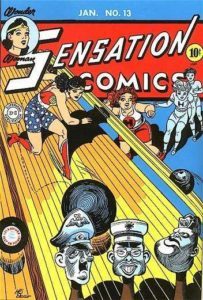 Sensation Comics Jan. No. 13 (Source)
Sensation Comics Jan. No. 13 (Source)
Overall I really enjoyed and found value in creating a document based lesson. This semester I’ve been reading, Lies My Teacher Told Me, by James W. Loewen and a quote that really stood out to me was, “What would we think of a course in poetry in which students never read a poem? (pg. 7).” I kept thinking about this quote throughout this lesson because that’s how high school social studies have been teaching history to students, and I feel document based lessons is an alternative that fixes that problem. It gives students a chance to work with primary resources and challenges them to be the historians in the process. The challenge for me was what primary resources to use, and what questions did I want my students to answer. I am glad I got to use a topic that I am super passionate about and be able to use it as my document based lesson project. The hard part was finding comic book covers that was available to share. Especially because Marvel and DC comics have heavy copyright laws that protect their work. My plan is to use this next year with my students at OPEN School.
What I gained most from this project was the skills of using google and Apple’s book author program. I am already thinking of creating another document based lesson on a different subject just so I can continue to grow my skills in using this program to be a better teacher. My only feed back I would give about this project that it’s a bit difficult for people that may not have a Apple device on hand.

